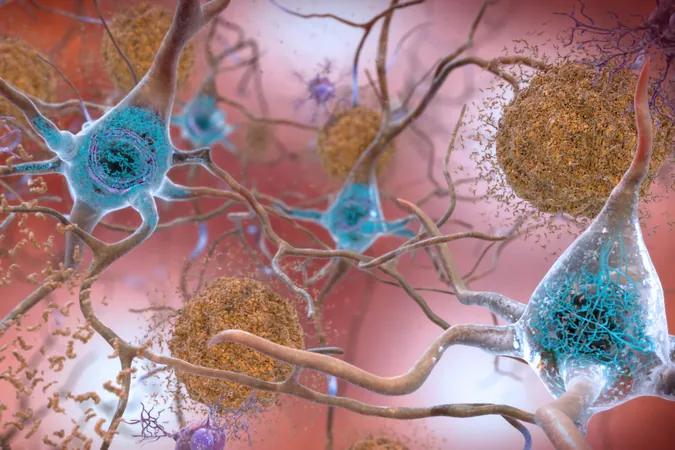
Unlocking Alzheimer's: How a Hidden Gene Variant Could Hold the Key
2025-09-10
Author: Daniel
Revealing the Mystery of ABCA7 and Alzheimer’s Disease
An illuminating study from MIT neuroscientists has uncovered how rare gene variants of ABCA7 are linked to Alzheimer’s disease, shedding light on a potential pathway that affects millions. This groundbreaking research could change the game in Alzheimer’s understanding and treatment.
The Impact of ABCA7 Variants
These rare ABCA7 variants, found in a tiny fraction of the population, significantly increase Alzheimer’s risk. Researchers discovered that these mutated genes disrupt lipid metabolism, crucial for maintaining healthy cell membranes. This disruption makes neurons overly excited, pushing them into states that can inflict serious damage to DNA and other vital cellular structures.
Notably, the researchers found that administering choline, a key component needed for cell membranes, could reverse some of this damage.
Promising Research Outcomes
Djuna von Maydell, a graduate student at MIT and lead author of the study, noted the remarkable effects of choline treatment: "After administration, many transcriptional defects were corrected, and hyperexcitability in affected neurons was significantly reduced." With findings published in the prestigious journal Nature, this research highlights a potential new avenue for treatment.
The Genetic Connection
Genomic studies indicate that individuals carrying low-function variants of ABCA7 face double the risk of developing Alzheimer’s compared to those without such variants. The ABCA7 gene is critical for lipid transport across cell membranes, and it has been linked to another well-known Alzheimer’s risk factor: APOE4.
Deep-Dive into Cellular Alterations
To unravel the connection between ABCA7 variants and Alzheimer’s, researchers scrutinized samples from the Religious Orders Study/Memory and Aging Project, which has been collecting data since 1994. By employing advanced single-cell RNA sequencing, they pinpointed significant gene alterations related to lipid metabolism and oxidative stress in neurons missing ABCA7.
Restoring Balance with Choline
Building on their findings, the team experimented with CDP-choline, a precursor for phosphatidylcholine, targeting the disturbed lipid metabolism directly. Remarkably, not only did this boost phosphatidylcholine production, but it also normalized mitochondrial function and decreased oxidative stress levels.
They then created 3D organoids from induced pluripotent stem cells to simulate Alzheimer’s pathology and found elevated amyloid beta proteins—hallmarks of Alzheimer’s. However, these levels normalized with choline treatment, effectively reducing neuronal hyperexcitability.
A Nutrient to Consider
Tsai's past research with mouse models indicates that choline may hold therapeutic potential against other Alzheimer’s-linked gene variants as well. In collaboration with various institutions, she is currently launching a clinical trial to investigate the effects of choline supplements on individuals carrying the APOE4 variant.
Choline-rich foods like eggs, meat, and fish could become an important ally in combating Alzheimer’s. Tsai asserts, "Restoring lipid homeostasis through supplementation could help alleviate Alzheimer’s-related pathology, not just for rare ABCA7 carriers but potentially for a broader population.”
A Larger Implication
Interestingly, aside from the rare variants, a more common ABCA7 variant exists, affecting roughly 18% of the population, previously deemed harmless. However, this study reveals it may also contribute to similar lipid metabolism disruptions.
This crucial research indicates that ABCA7 dysfunction might be a hidden player in the Alzheimer’s epidemic, extending far beyond those with rare genetic variants, opening doors to future research on lipid homeostasis as a target for Alzheimer's treatment.
With ongoing investigations and potential clinical applications on the horizon, the findings from this study pave the way for new strategies in the fight against Alzheimer's disease.

 Brasil (PT)
Brasil (PT)
 Canada (EN)
Canada (EN)
 Chile (ES)
Chile (ES)
 Česko (CS)
Česko (CS)
 대한민국 (KO)
대한민국 (KO)
 España (ES)
España (ES)
 France (FR)
France (FR)
 Hong Kong (EN)
Hong Kong (EN)
 Italia (IT)
Italia (IT)
 日本 (JA)
日本 (JA)
 Magyarország (HU)
Magyarország (HU)
 Norge (NO)
Norge (NO)
 Polska (PL)
Polska (PL)
 Schweiz (DE)
Schweiz (DE)
 Singapore (EN)
Singapore (EN)
 Sverige (SV)
Sverige (SV)
 Suomi (FI)
Suomi (FI)
 Türkiye (TR)
Türkiye (TR)
 الإمارات العربية المتحدة (AR)
الإمارات العربية المتحدة (AR)